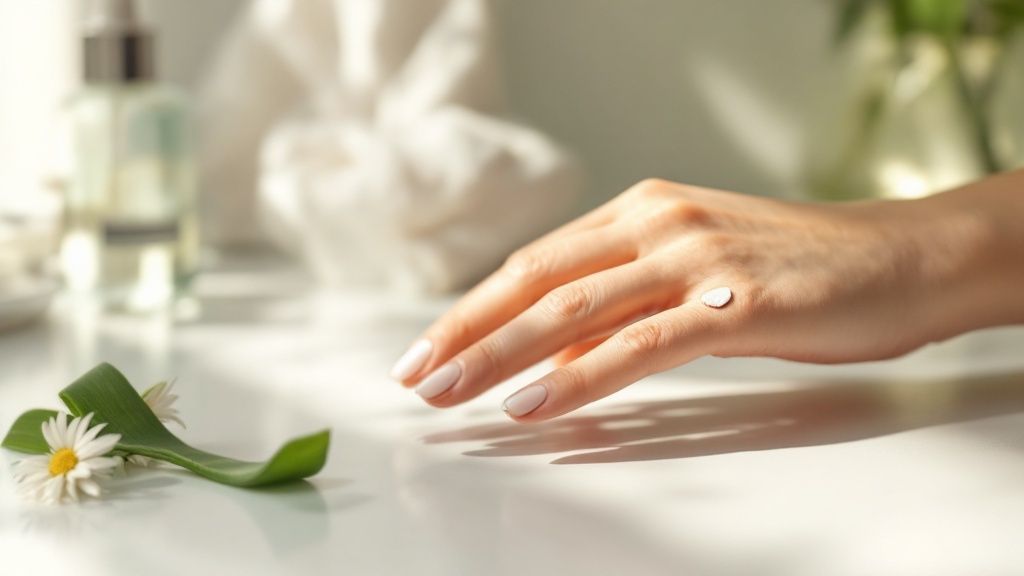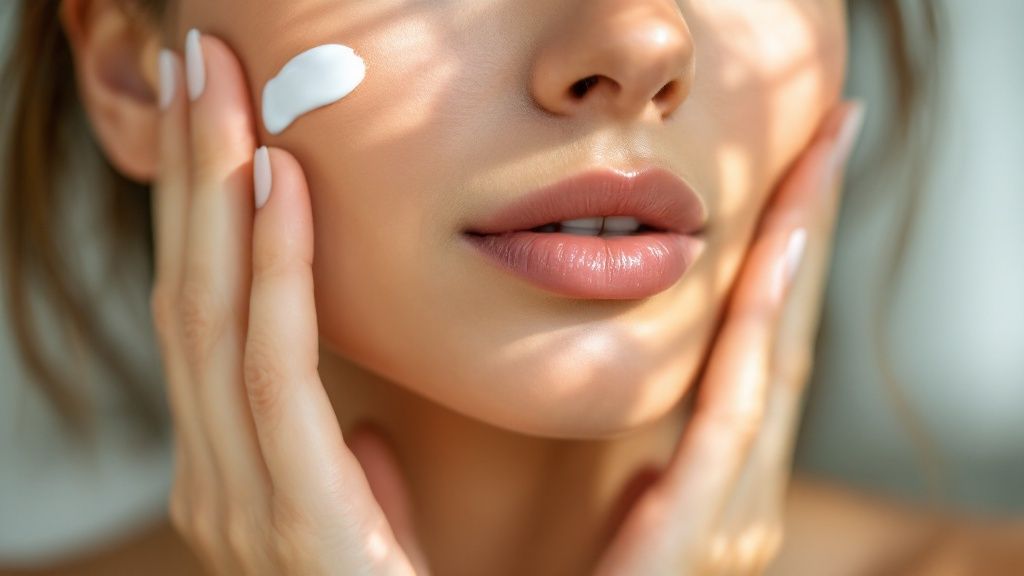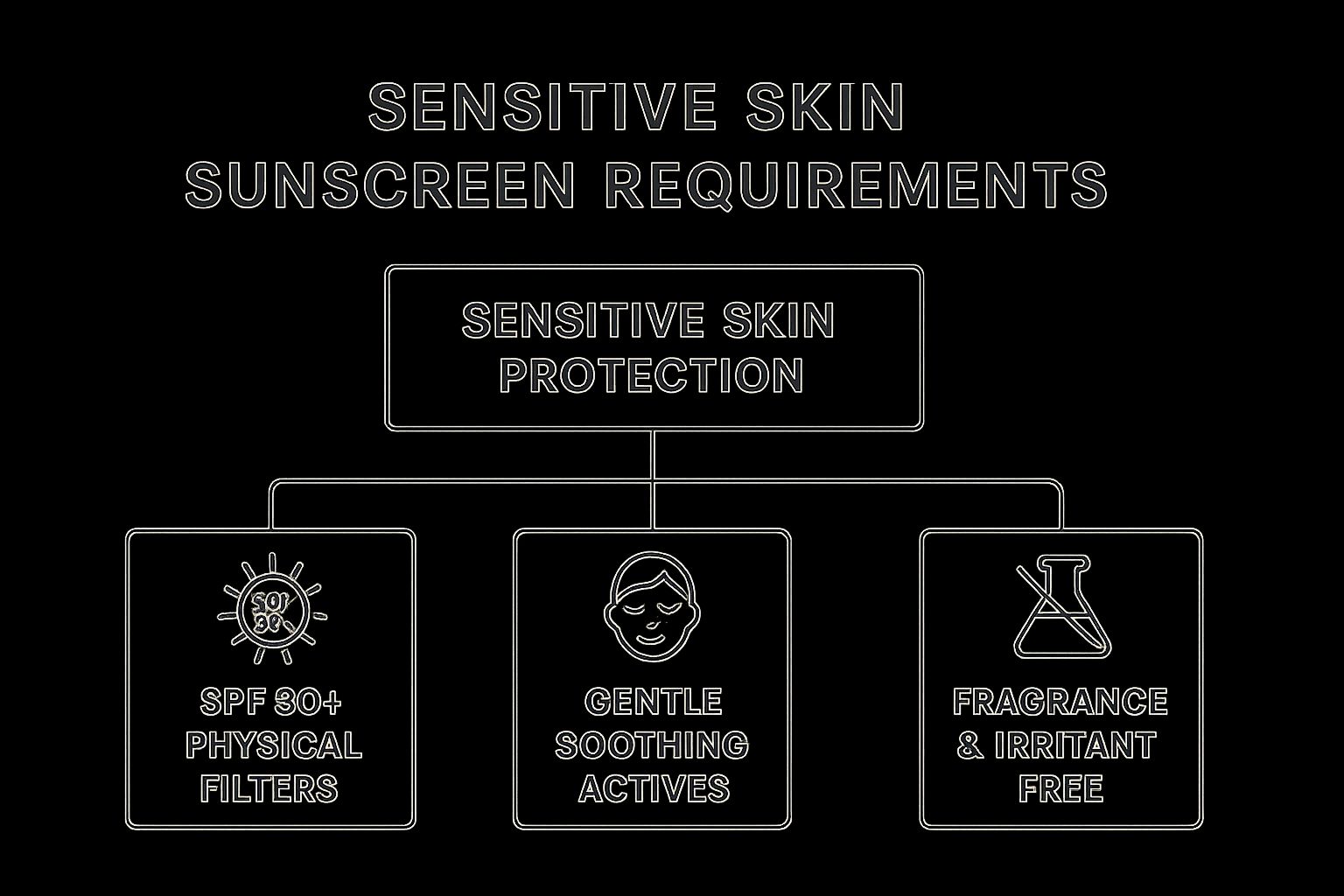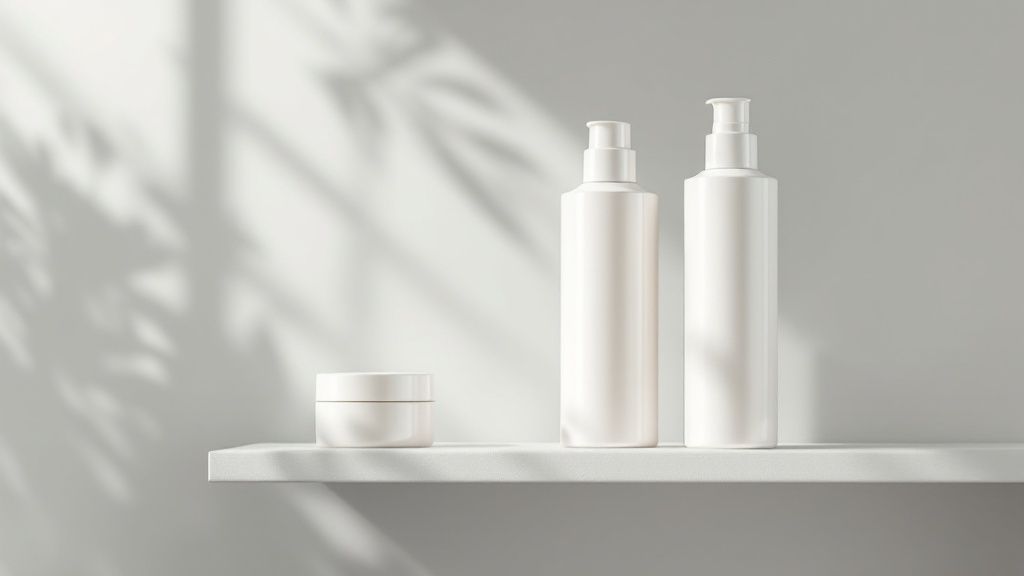
If you're hunting for the best sunscreens for sensitive skin, let me give you a head start: mineral-based formulas with zinc oxide are almost always your safest bet. Think of them as a gentle, physical shield against UV rays, without the risk of irritation that often comes with chemical filters. For skin that reacts to just about anything, this is a game-changer.
Your Guide to Irritation-Free Sun Protection

Finding a sunscreen that actually protects your sensitive skin—without causing redness, breakouts, or that awful stinging feeling—can feel like a never-ending quest. Too many products promise gentle care but deliver a dose of frustration instead. It’s enough to make you want to skip daily sun protection altogether, but we know that's not an option.
This guide is here to end that cycle. We're going to cut through the marketing noise and give you clear, practical advice. No more trying to decipher complicated ingredient lists in the store aisle or crossing your fingers that a new formula won't trigger a reaction.
What to Expect in This Guide
We're going to dive deep into everything you need to know to finally make a confident choice. You won't just learn what to buy, but why certain ingredients and formulas are a godsend for delicate complexions.
After all, proper sun protection is the foundation of any good skincare routine, especially when you're managing sensitivity. If you're looking to build out your entire regimen, our guide on how to achieve a radiant complexion with Epicutis is the perfect companion piece to the sun safety tips we’ll cover here.
Here’s a quick look at what’s ahead:
- The Gold Standard: We’ll break down exactly why dermatologists and skincare experts consistently recommend mineral sunscreens for sensitive skin.
- Ingredient Deep Dive: You'll become an expert at spotting both the good guys (calming, supportive ingredients) and the bad guys (common irritants) on any label.
- Product Recommendations: We’ll share some of our top-rated picks, including gentle but powerful options like the Barb N.P. Mineral Defense Sunscreen.
- Beyond Application: We’ll also touch on post-sun recovery techniques. Think tools like the BARB N.P. Facial Mask, which uses its wireless design and three light settings to help soothe inflammation and dial down redness after a day outdoors.
By the time you're done reading, you'll have the know-how to pick a sunscreen that not only shields you from UV damage but also actively calms and supports your skin's health for the long haul.
Understanding Mineral vs. Chemical Sunscreens
When you're on the hunt for a sunscreen that won't make your sensitive skin angry, the biggest decision you'll face is whether to go with a mineral or a chemical formula. These two camps of sun protection work in completely different ways, and for skin that reacts to just about everything, that difference is a game-changer. Getting this one thing right is the first, most important step to finding a sunscreen that actually works with your skin.
Mineral Sunscreens: Your Skin's Bodyguard
Think of mineral sunscreens as a physical shield. They use natural minerals—typically zinc oxide and titanium dioxide—that sit right on top of your skin. Instead of soaking in, they create a barrier that acts like a bunch of tiny mirrors, physically deflecting and scattering away the sun's harmful UV rays.
It’s this gentle, on-the-surface approach that makes them the go-to recommendation for anyone dealing with sensitivity, rosacea, or eczema. No absorption, less chance for a reaction. Simple.
Chemical Sunscreens: The Sponge Approach
Chemical sunscreens, on the other hand, work more like a sponge. They rely on active ingredients like oxybenzone or avobenzone that absorb into your skin. Once they've settled in, they wait for UV radiation to strike. When it does, these chemicals spark a reaction that converts the UV rays into heat, which is then released from your body.
For a lot of people, this process is totally fine. But for sensitive complexions, introducing new chemicals and generating heat can be the perfect recipe for redness, stinging, and all-around irritation.
To make it even clearer, here’s a quick breakdown of how these two types stack up.
Mineral vs. Chemical Sunscreen: A Quick Comparison
This table offers a side-by-side look at the key differences, helping you see why one is often a better fit for sensitive skin.
| Feature | Mineral Sunscreen (Physical) | Chemical Sunscreen (Organic) |
|---|---|---|
| Active Ingredients | Zinc Oxide, Titanium Dioxide | Oxybenzone, Avobenzone, Octinoxate |
| How It Works | Sits on top of skin, reflects UV rays | Absorbs into skin, converts UV to heat |
| Best For | Sensitive, acne-prone, rosacea-prone skin | Most skin types, often in sheer formulas |
| Irritation Risk | Very low, generally well-tolerated | Higher potential for stinging & reactions |
| Protection Starts | Immediately upon application | After about 20-30 minutes |
Ultimately, the choice comes down to what your skin can handle. But as you can see, the evidence for mineral formulas is pretty compelling if you're on the sensitive side.

As this image highlights, the best sunscreens for sensitive skin are built on a simple foundation: they use physical filters, ditch common irritants, and often include ingredients that actively soothe the skin.
It’s no surprise that the demand for these gentler options has skyrocketed. The global market for sensitive skin sunscreens was valued at around $14.54 billion in 2025 and is only expected to climb as more people seek out hypoallergenic formulas that rely on physical blockers.
We've Moved Past The White Cast Myth
Now, I know what you might be thinking. Mineral sunscreens? Aren't those the thick, pasty lotions that leave a chalky white cast?
That used to be a fair complaint, but thankfully, formulation technology has come a very long way. Today’s best mineral sunscreens are made with micronized or nano-sized particles of zinc oxide and titanium dioxide. These particles are incredibly tiny, so they provide the same fantastic broad-spectrum protection without that old-school opaque finish.
The result? Modern formulas are lightweight, blend beautifully, and feel great on the skin, making them perfect for everyday wear, even under makeup. You really don't have to sacrifice a natural look for safe, effective protection anymore. For a deeper dive into how these formulas have evolved, check out our guide on mineral sunscreen vs. chemical sunscreen.
Decoding Labels and Identifying Skin-Friendly Ingredients

Let's be honest: walking down the skincare aisle can feel like you're about to take an exam you didn't study for. The ingredient lists on sunscreen bottles are notoriously long, packed with scientific names, and just plain confusing. But figuring out what to look for—and what to run from—is the secret to finding the perfect sunscreen for your sensitive skin.
This isn't about memorizing every last chemical compound. It’s about learning to spot the heroes and the villains for your reactive skin. Once you have a simple playbook, you can scan any label in seconds and know if a product is a potential friend or a definite foe.
This growing ingredient awareness is a huge deal in the beauty world. The global market for sensitive skin sunscreens was already valued at around $1.5 billion back in 2022, and it's set to grow as more of us demand clean, transparent formulas. People are actively seeking out soothing extracts and avoiding harsh chemicals, which is pushing brands to create better products. You can dive deeper into these trends in this market analysis on sensitive skin sunscreens.
Green Flag Ingredients to Look For
Think of these ingredients as your skin's support team. When you see them on a label, it's a great sign that the formula is designed not just to protect, but also to calm and strengthen your skin barrier.
- Niacinamide (Vitamin B3): This is a true multitasking superstar. It helps dial down redness and inflammation, can make pores look smaller, and supports a healthy skin barrier—something that's often compromised in sensitive skin.
- Ceramides: These are lipids, or fats, that are naturally in your skin and are crucial for locking in moisture. Sunscreens with added ceramides help reinforce that natural barrier, preventing water loss and keeping irritants out.
- Hyaluronic Acid: Famous for its incredible ability to hold onto water, this ingredient delivers a major dose of hydration without feeling heavy or greasy. It just leaves your skin feeling plump and comfortable.
The ultimate win is finding a product that pairs these beneficial ingredients with gentle mineral filters. A great example is the Barb N.P. Mineral Defense Sunscreen, which offers that ideal blend of robust protection and skin-loving care.
Red Flag Ingredients to Avoid
Now, let's talk about the troublemakers. These are the common irritants notorious for triggering reactions in sensitive skin. If you spot them high up on an ingredient list, it's probably best to put the bottle back on the shelf.
Key Takeaway: For sensitive skin, what a sunscreen doesn't have is just as important as what it does have. A clean, simple formula will always be your safest bet.
- Fragrance (Parfum): This is the number one cause of skin sensitization from cosmetics. "Fragrance" is a catch-all term that can hide dozens of potential irritants. Always, always look for formulas labeled "fragrance-free."
- Drying Alcohols: Keep an eye out for ingredients like "alcohol denat," "SD alcohol," or "isopropyl alcohol." These can strip your skin of its natural oils, leaving it feeling dry, tight, and irritated.
- Oxybenzone and Avobenzone: While they are effective UV filters, these two chemical agents are frequently linked to allergic reactions and that dreaded stinging sensation, especially for those with delicate skin.
Finally, get familiar with a couple of key label terms. "Non-comedogenic" means the product is formulated so it won't clog your pores, and "hypoallergenic" suggests it’s less likely to cause an allergic reaction. While they aren't foolproof guarantees, they are definitely helpful starting points in your search.
Our Top Sunscreen Picks for Sensitive Skin
Alright, we’ve waded through the science and learned how to read an ingredient list. Now for the fun part: putting that knowledge to work and finding a sunscreen you’ll actually love to wear. The sunscreen aisle can feel like a maze, so I've narrowed it down for you.
I’ve handpicked these products based on our strict criteria for sensitive skin. We're talking gentle mineral formulas, calming ingredients, and textures that feel so good you'll forget you're even wearing SPF. These are designed to take all the guesswork out of finding your perfect match.
Our Top Pick: Barb N.P. Mineral Defense Sunscreen
The clear winner in my book is the Barb N.P. Mineral Defense Sunscreen. This isn't just a sunscreen; it's a daily shield that genuinely cares for your skin. It strikes that perfect balance between powerful protection and soothing benefits, which is exactly what sensitive complexions need.
So, what makes it so special?
- Purely Zinc Oxide: It uses only zinc oxide, the undisputed champion of mineral filters, for solid broad-spectrum SPF 50 protection without any chemical irritants.
- Calming Power: The formula is packed with ingredients that actively reduce visible redness, helping your skin stay calm and feel comfortable all day.
- A Dream to Wear: Forget those thick, chalky mineral sunscreens of the past. This one is incredibly lightweight, absorbs right in without any greasy residue, and creates a beautiful, smooth canvas for makeup (or no makeup at all).
This sunscreen is proof that you don't have to choose between effective protection and a beautiful formula. It delivers dermatologist-level defense with the feel of a high-end moisturizer, easily making it one of the best choices for sensitive skin on the market.
Other Fantastic Options for Sensitive Skin
While the Barb N.P. Mineral Defense is my number one, I know skincare is never a one-size-fits-all situation. Your perfect sunscreen might depend on your lifestyle or specific skin concerns.
Here are a few other excellent contenders worth exploring:
- For a Touch of Tint: A tinted mineral sunscreen is a game-changer for those "no-makeup makeup" days. It evens out your skin tone beautifully. Pro tip: look for formulas with iron oxides. They provide the tint and give you extra protection against blue light from your phone and computer screens.
- For Workouts and Beach Days: If you're going to be swimming or sweating, water resistance is non-negotiable. These formulas are designed to adhere to the skin better when wet, though you'll still need to reapply regularly to stay fully protected.
- For Extra-Soothing Care: When your skin is feeling particularly fragile, a clear, ultra-lightweight formula can be a lifesaver. A great example is the SkinCeuticals Clear Daily Soothing UV Defense Sunscreen SPF 50, which is known for its incredibly gentle yet effective formulation.
Your Daily Sun Protection and Recovery Routine

Truly protecting sensitive skin goes beyond just slathering on some cream in the morning and hoping it holds up. To build real, long-term resilience, you need a consistent daily routine. This means applying sunscreen correctly and giving your skin the support it needs to recover after a day out in the world.
When you create these simple habits, you’re getting the absolute most out of your sunscreen. It’s no longer just a protective layer; it's a proactive step toward keeping your skin healthy, calm, and happy.
Mastering Your Sunscreen Application
Let’s be honest: how you put on your sunscreen matters just as much as which one you buy. The single biggest mistake I see people make is not using enough. It’s an easy trap to fall into, but it leaves your skin exposed even when you think you’re covered.
So, how much is enough? To get the actual SPF protection promised on the bottle, the ‘two-finger rule’ is your best friend. Just squeeze two full lines of sunscreen down your index and middle fingers. That’s the perfect amount for your face and neck.
Always apply it as the final step in your morning skincare routine, just before any makeup. And please, don't forget the easy-to-miss spots—your ears, the back of your neck, and right up to your hairline.
The Critical Importance of Reapplication
Sunscreen isn’t a set-it-and-forget-it deal. Its protective power fades throughout the day, and it breaks down much faster when you’re sweating, swimming, or even just sitting by a bright window.
The rule is simple but non-negotiable: you have to reapply your sunscreen at least every two hours. If you’ve been for a swim or had a good workout, reapply as soon as you towel off.
This commitment is what prevents the sneaky, cumulative damage that leads to irritation and premature aging. It's clear people are catching on, too. The global market for sensitive skincare was valued at an incredible $36.16 billion in 2024, and a huge part of that growth is from more of us finally adopting daily sun protection. You can dive deeper into these sensitive skin care product market trends to see just how big this shift is.
Post-Sun Recovery and Calming Inflammation
Even when you’ve done everything right, a long day can leave sensitive skin feeling a little frazzled. This is where your post-sun recovery routine comes in. The goal here is simple: soothe any low-level inflammation and help your skin’s natural barrier repair itself while you sleep.
A fantastic tool to have in your corner for this is the BARB N.P. Facial Mask. It’s the perfect bookend to a day of sun protection, designed to bring calm back to your skin. I particularly like that it's wireless and comfortable, so you can actually relax during a treatment instead of feeling tied to a wall outlet.
The mask has 3 lighting settings for different treatments, making it incredibly useful for post-sun care:
- Red Light Therapy: This is your go-to for repair. It helps dial down inflammation and encourages collagen production, supporting your skin’s recovery from environmental stressors like UV rays.
- Yellow Light Therapy: Think of this as the ultimate calming signal for your skin. It’s brilliant at reducing redness and soothing that tight, sensitive feeling after a day outdoors.
- Blue Light Therapy: While it’s best known for fighting acne bacteria, it also supports overall skin health and balance.
Finishing your day with a quick session under the BARB N.P. Facial Mask is an amazing way to coddle your complexion, ensuring it stays resilient, healthy, and ready for whatever comes next.
Your Sunscreen Questions, Answered
Even after you've got the basics down on mineral filters and skin-soothing ingredients, a few questions might still be nagging you. That's totally normal. Finding the right sun protection when your skin is reactive can feel like a minefield, and getting straight answers is the best way to feel good about what you're putting on your face.
Let's clear up some of the most common things people ask. We'll get right to the point so you can feel confident you're doing the best for your delicate skin, every single day.
Can I Just Use Regular Sunscreen If I Put a Barrier Cream on First?
It sounds like a smart hack, but unfortunately, this isn't a reliable strategy for sensitive skin. Chemical sunscreens need to absorb into your skin to work their magic (turning UV rays into heat), and those active ingredients can often find their way through a standard barrier cream and still cause irritation.
Your safest bet is always to stick with a product designed from the ground up to be one of the best sunscreens for sensitive skin. A mineral formula is perfect because it is the barrier—it sits right on top of your skin and doesn't need to be absorbed to do its job.
Is a Higher SPF Always Better for Sensitive Skin?
Not really. For sensitive skin, the formula itself is way more important than the SPF number. Think about it: a harsh, chemical-packed SPF 100 is probably going to cause more trouble than a beautifully formulated, gentle SPF 30. Plus, the difference in protection at those higher levels is smaller than most people think.
To put it in perspective, SPF 30 blocks about 97% of UVB rays. SPF 50 blocks around 98%. That's a tiny jump. You're much better off finding a mineral sunscreen with an SPF between 30 and 50 that your skin loves, and then focusing on applying enough of it and reapplying it often.
How Do I Get All This Sunscreen Off Without Making My Skin Angry?
The best way to remove stubborn, water-resistant sunscreen without scrubbing your face raw is a technique called double cleansing. It’s a two-step method that melts everything away gently, protecting your fragile skin barrier.
Here’s how you do it:
- First Cleanse (Oil): Start with an oil-based cleanser or a cleansing balm on dry skin. Gently massage it all over your face. The oil is brilliant at breaking down and dissolving the sunscreen, makeup, and any grime from the day.
- Second Cleanse (Water): Rinse with lukewarm water. Now, go in with your regular gentle, hydrating, water-based cleanser to wash away any last traces of oil and residue.
This process leaves your skin completely clean and ready for your nighttime routine. Try to skip the makeup wipes—they often contain irritating alcohol or fragrance, and the physical tugging alone can be enough to cause redness.
Do I Really Need to Wear Sunscreen on Cloudy Days or When I'm Inside?
Yes, one hundred percent. If you remember only one thing, make it this: up to 80% of the sun's UV rays can slice right through clouds. You're getting a lot more sun exposure on an overcast day than you realize.
And it doesn't stop there. UVA rays—the ones responsible for premature aging and a major contributor to skin cancer—can also penetrate window glass. So, if you’re sitting by a window at home, in the office, or driving your car, your skin is still being exposed. Making a broad-spectrum sunscreen an automatic part of your daily routine is the single most powerful thing you can do to protect your skin's health for the long run.
At BotoxBarb, we know that finding the right products is the key to calm, healthy, and protected skin. Take a look at our curated collection of medical-grade skincare, where we've handpicked gentle and effective sunscreens perfect for even the most sensitive complexions. Find your perfect match and build a routine you love at barbnp.shop.

